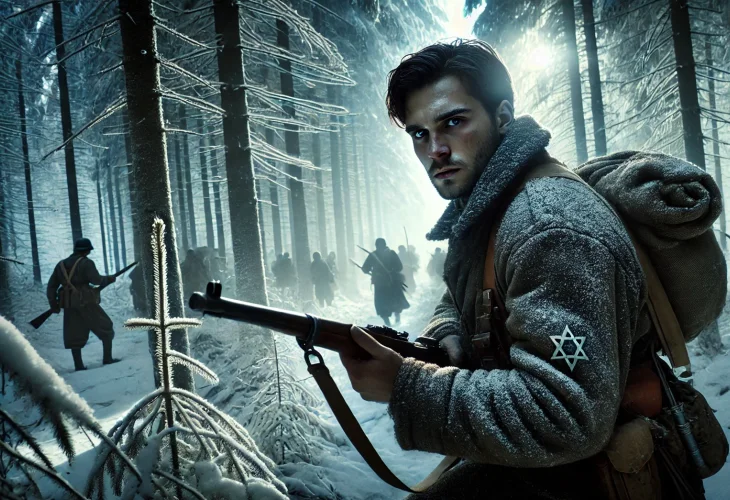History and Archaeology
From Nazi Forests to Kfar Chabad: Zusha’s Journey
From a Hasidic rabbi’s son to a fearless partisan and later a Chabad leader, Zusha’s life was defined by action and courage

R’ Moshe Gurary, a well-off Hasidic Jew from Tel Aviv and owner of the famous “Dubek” cigarette factory, was once at the Chabad Rebbe’s synagogue in 1948 as part of public service. He overheard the Rebbe asking about “a young man Z.V. from Israel” and speaking about him with his son-in-law, the future and last Lubavitcher Rebbe. R’ Moshe was amazed that such a towering leader would show such interest in a young man from Israel. When he returned home, he arranged to meet Zusha Wilimovsky and soon understood why the Rebbe’s regard for him was so high.
Zusha’s energy was boundless. He founded girls’ schools, charity organizations, women’s Torah classes, and printed holy Jewish texts at a time when few in Israel were involved in such work. In 1949, at the request of the Chabad Rebbe, he helped establish a neighborhood for Chabad members that later became the well-known Kfar Chabad.
But why did the Rebbe notice him when he was still a young man?
Zusha’s story began far from Tel Aviv. He was the son of the rabbi of Seltz in Poland. During the German invasion of Poland, he fled to Lithuania and enrolled in the yeshiva of Rabbi Elchanan Wasserman in Baranovichi. As the Nazis advanced, the yeshiva students fled to Smilchuk. There, Zusha warned Jewish families of the danger approaching, helping many to escape further east.
During these wanderings, Zusha was captured by the Nazis and sent to the Lida Ghetto. There, he reunited with his study partner from Baranovichi, David Gershovitz. Together, they managed to escape the ghetto, but they were caught again and sent to a Nazi labor camp. Life there was brutally oppressive, but the two friends constantly planned their escape. They knew that staying meant certain death, yet escaping also meant risking their lives.
One day, a random verse they encountered gave them courage: “They wandered from nation to nation, from one kingdom to another people.” Taking this as a sign from Heaven, they decided to act. The next day, during wood-cutting work in the forest, they waited for the moment when the guard shift changed and then they ran. Before the guards realized, they had vanished into the woods.
Zusha had already learned of Jewish partisan fighters hiding in the forests, and the two made contact. To join, they had to prove their military ability, which they managed to do with ingenuity. Soon, they were taking part in raids against the Nazis. “We killed many Germans,” Zusha recalled in his later years. During one battle, he was shot in the leg but survived, thanking Hashem for His mercy. Their main mission, however, was rescuing Jews from Nazi captivity. Many Jews later remembered the sight of a sudden gunshot taking down a guard, followed by two Jewish partisans calling out: “You’re free come with us!”
Life in the forest was harsh. “We lived under trees,” Zusha remembered, “covering ourselves with cloth at night. In winter, we’d wake up and shake the snow off our blankets.” Later, they dug underground shelters, called zimlankot, where they slept. When David fell gravely ill, Zusha dug a pit to keep him warm and brewed hot drinks again and again until his friend recovered.
Before Passover in 1943, the Jewish partisans cleaned away their last crumbs of chametz, set a pot over the fire, prepared kosher food for the festival, and even baked a few burnt matzot. That year, they celebrated the Seder night in the forest.
The war’s final days were among the most dangerous, as retreating Nazi soldiers often killed without reason. Zusha and David kept moving, finding refuge in the home of Rabbi Avraham Yeshaya Kalf, later the Nadvorna Rebbe in Israel, who hid them until the war ended.
After the war, they immigrated to Israel and returned to yeshiva study. But Zusha did not rest for long, he quickly threw himself into promoting Torah learning across the country. His dedication drew the attention of the Chabad Rebbe, who warmly called him “my partisan.” The Rebbe explained: “A partisan doesn’t look left or right, he just does what needs to be done, even without official orders.” On one occasion, the Rebbe handed him a bottle and said, “Share this with all the partisans in Israel.”

